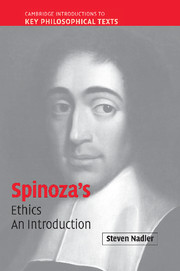Book contents
5 - The human being
Published online by Cambridge University Press: 05 June 2012
Summary
By the end of Part One, Spinoza has laid out the broad metaphysical picture of his universe. Everything that is belongs to a single, necessarily existing, infinite substance, a unique and all-encompasing system outside of which there is nothing and whose own internal power and principles immanently bring about all things with an absolute or mathematical necessity. This substance can be called ‘God’ or it can be called ‘Nature’. Either way, it leaves no room for the kind of psychologically and morally endowed deity that the Judeo-Christian tradition posits as the creator of things and which Spinoza rejects as an anthropomorphic fiction that encourages superstition.
In Part Two, Spinoza turns his attention to the world of actually existing finite modes, and in particular to one of the “singular things” that make up this durational realm: the human being. Because Spinoza's ultimate goal is an explanation of human happiness in a deterministic universe, he needs first of all to investigate what exactly a human being is and how it fits into the metaphysical scheme of things. The striking feature of Spinoza's anthropology will be his opposition to any conception of human nature that makes it a kind of “dominion within a dominion” that is exempt from the laws of nature that govern everything else. Ontologically speaking, there is nothing whatsoever that distinguishes a human being from any other particular and determinate mode in nature.
- Type
- Chapter
- Information
- Spinoza's 'Ethics'An Introduction, pp. 122 - 153Publisher: Cambridge University PressPrint publication year: 2006
- 1
- Cited by

